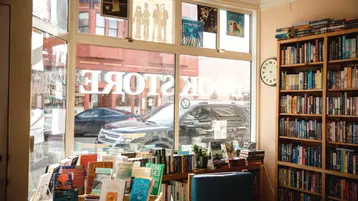Amidst the Pandemic, Bookstores Try Novel Marketing Ideas
June 4, 2020

“We’re trying to replicate what it looks like to go into our store and put it online.”Part of the BookPeople experience is browsing funky gifts like greeting cards, socks, and tchotchkes, so those sales have disappeared. “We’re trying to replicate what it looks like to go into our store and put it online,” Rejsek says. “I have my gift buyer putting together a book reader box.” They are also working to replace revenue from in-store events by moving author events online. “When we were in the store, we had a marketing team who booked the events and had an events team who produced the events,” Rejsek says. “To produce an entire event through Zoom is very different.” But now, 2 months after closing to the public, they’re announcing new events almost daily. The booksellers also host a happy hour every Friday so they can engage with the community on Twitter. “We look forward to the day that we can open our doors and browse all the books but for now we’re just trying to engage our community of books through our online events,” Rejsek says.
Promotions for supporting local businesses through gift card purchases and revenue from Libro.FM (an audiobook service similar to Audible that supports indie bookstores) have helped.As a small store, The Village Bookstore doesn’t host a lot of author events in store, but they do partner with other venues to host events. For instance, they hosted a Facebook Live with Columbia University’s School of Journalism to discuss nonfiction. They’re also partnering with a local library to host an event for teens to celebrate the release of the prequel in the Hunger Games series. “We’re focused on continuing providing the services that are helping people get books into their hands,” Kohn says.
“One positive thing that’s come out of this is, I think people have started to find more comfort in reading.”In the meantime, Old Town Books has a literary fiction subscription service called With Love, From Old Town that focuses on debut authors. “People have been really receptive towards it,” Sanchez says. “They get a newsletter with each package telling them about the book and why we picked it.” Subscribers also get access to a monthly book club to discuss the book online. Prior to the pandemic, Old Town Books hosted sporadic writing classes. Now, without geographic limitations, they’ve had huge interest in online writing classes with authors like Sarah Gailey, Alexander Chee, and Sarah MacLean. The authors donate their time to teach the class, and donations from participants support the store. “ For some well-known authors who would typically go to a larger indie bookstore, it was really cool to see them help us in a virtual space,” Sanchez says. This summer, they are also moving their Emerging Writers Festival online. Thanks to these efforts, Old Town Books has seen higher sales compared to this time last year and hasn’t furloughed or laid off staff. “One positive thing that’s come out of this is, I think people have started to find more comfort in reading,” Sanchez says.
This communication is for informational purposes only; it is not legal, tax or accounting advice; and is not an offer to sell, buy or procure insurance.
This post may contain hyperlinks to websites operated by parties other than TriNet. Such hyperlinks are provided for reference only. TriNet does not control such web sites and is not responsible for their content. Inclusion of such hyperlinks on TriNet.com does not necessarily imply any endorsement of the material on such websites or association with their operators.

